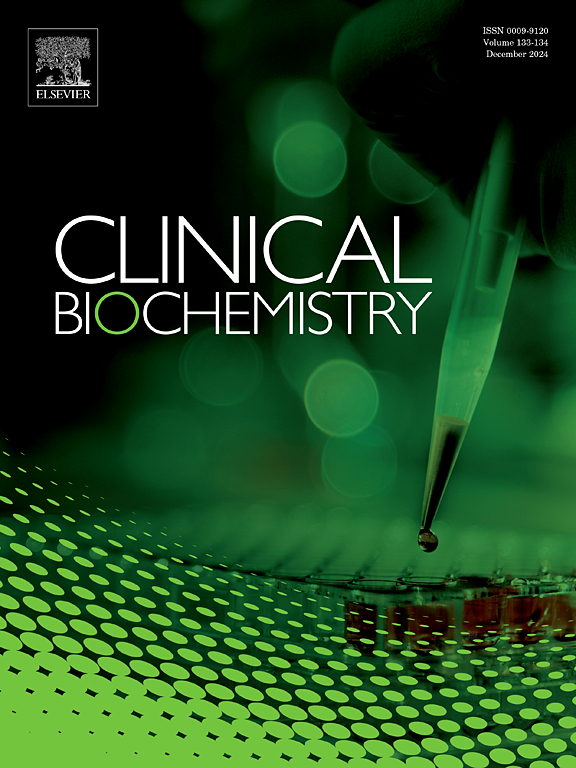Optimization and validation of the Kairos amino acid Kit for plasma amino acid monitoring in inherited metabolic disorder patients
IF 2.1
3区 医学
Q2 MEDICAL LABORATORY TECHNOLOGY
引用次数: 0
Abstract
Purpose
Genetic disorders affecting amino acid metabolism are a significant subset of inherited metabolic disorders (IMDs). Plasma amino acid (PAA) analysis is used for the diagnosis and monitoring of these disorders in order to avoid development of severe symptoms. However, PAA assays are often lengthy in analysis time (>2h/sample) and some methods lack specificity and sensitivity. This project offers a novel solution through the optimization and clinical validation of the Kairos Amino Acid Kit by Waters Corp.
Design and methods
Using liquid chromatography with tandem mass spectrometry and 6-aminoquinolyl-N-hydroxysuccinimidyl carbamate derivatization, amino acid quantification has been achieved for 45 amino acids in 15 min of chromatography time per sample. The method utilizes reversed-phase chromatography via a high-strength silica C18 column. The optimized column chemistry enables strong hydrophobic retention, resolving all isobaric amino acids for individual mass-spectrometer quantification. Method validation protocols include linearity, sensitivity, precision, and bias.
Results
Clinical validation has been performed, indicating high reproducibility and clinical applicability. Linearity results demonstrated 42/45 amino acids with R2 > 0.975 over a linear range of at least 5–1000 µmol/L. Spiked plasma calibrators demonstrated high recovery with R2 > 0.971. Twenty-day precision testing demonstrated total coefficient of variation < 15 % and sensitivity testing confirmed all analytes have limits of detection < 5 µmol/L, indicating high analytical sensitivity and precision. Method comparison to Waters’ MassTrak Kit demonstrates acceptable bias and supports a future study to update reference intervals.
Conclusion
The clinical validation of the Kairos Amino Acid Kit for plasma amino acid monitoring highlights the potential of this novel method to enhance amino acid quantification in clinical laboratories for IMD management.
用于遗传性代谢紊乱患者血浆氨基酸监测的Kairos氨基酸试剂盒的优化与验证。
目的:影响氨基酸代谢的遗传疾病是遗传性代谢疾病(IMDs)的一个重要子集。血浆氨基酸(PAA)分析用于诊断和监测这些疾病,以避免发展成严重症状。然而,PAA检测的分析时间往往较长(每样样品约20小时),而且一些方法缺乏特异性和敏感性。本项目通过Waters公司的Kairos氨基酸试剂盒的优化和临床验证提供了一种新的解决方案。设计和方法:采用液相色谱串联质谱法和6-氨基喹啉- n -羟基琥珀酰氨基甲酸酯衍生化,在15 min的色谱时间内实现了每个样品45个氨基酸的氨基酸定量。该方法通过高强度二氧化硅C18柱采用反相色谱法。优化的柱化学具有很强的疏水保留能力,可解决所有等压氨基酸的单个质谱仪定量。方法验证协议包括线性、灵敏度、精密度和偏差。结果:经临床验证,重复性高,临床适用性强。线性结果为42/45个氨基酸,R2为 > 0.975,线性范围至少为5-1000 µmol/L。加标血浆校准器回收率高,R2为 > 0.971。结论:用于血浆氨基酸监测的Kairos氨基酸试剂盒的临床验证突出了这种新方法的潜力,可以加强临床实验室对IMD管理的氨基酸定量。
本文章由计算机程序翻译,如有差异,请以英文原文为准。
求助全文
约1分钟内获得全文
求助全文
来源期刊

Clinical biochemistry
医学-医学实验技术
CiteScore
5.10
自引率
0.00%
发文量
151
审稿时长
25 days
期刊介绍:
Clinical Biochemistry publishes articles relating to clinical chemistry, molecular biology and genetics, therapeutic drug monitoring and toxicology, laboratory immunology and laboratory medicine in general, with the focus on analytical and clinical investigation of laboratory tests in humans used for diagnosis, prognosis, treatment and therapy, and monitoring of disease.
 求助内容:
求助内容: 应助结果提醒方式:
应助结果提醒方式:


